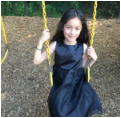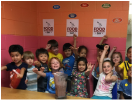
Joyful Learning
Cambridge students enjoy coming to school. Enjoying the process of learning positions our students to become life-long learners. Learning isn’t viewed by children as something you do to reach a goal; it is something you do because it is fun and exciting. Learning is part of who you are and it's why it is the most important focus of our school.
Cambridge students enjoy coming to school. Enjoying the process of learning positions our students to become life-long learners. Learning isn’t viewed by children as something you do to reach a goal; it is something you do because it is fun and exciting. Learning is part of who you are and it's why it is the most important focus of our school.

Unique Learning Styles and Experiences
Every human being is unique and every human being learns in a different way. At Cambridge there is no one-size-fits-all approach to education. We start by getting to know your child and recognizing the ways that he/she learns best. We then develop a strengths-based approach to prepare him or her for elementary school (and life) readiness. When children begin to trust their unique capabilities, they begin to grow in remarkable ways.
Every human being is unique and every human being learns in a different way. At Cambridge there is no one-size-fits-all approach to education. We start by getting to know your child and recognizing the ways that he/she learns best. We then develop a strengths-based approach to prepare him or her for elementary school (and life) readiness. When children begin to trust their unique capabilities, they begin to grow in remarkable ways.

Focus on Global Awareness and Foreign Languages
At Cambridge, we celebrate cultures around the world. We want our children to understand that there are many ways of living, eating, celebrating, dressing, speaking and knowing. In an increasingly globalized world, we are teaching children how to not only communicate with others but also understand their way of life. We believe that teaching students to understand and appreciate others, despite our differences, is essential for later success in life.
At Cambridge, we celebrate cultures around the world. We want our children to understand that there are many ways of living, eating, celebrating, dressing, speaking and knowing. In an increasingly globalized world, we are teaching children how to not only communicate with others but also understand their way of life. We believe that teaching students to understand and appreciate others, despite our differences, is essential for later success in life.

Self Regulation
Self-regulated children can not only delay gratification but also suppress their impulses long enough to think ahead to the possible consequences of their actions. Research indicates that these two facets of self regulation are related: children who cannot control their emotions at age four are unlikely to be able to follow the teachers’ directions later in life. We embed intentional make-believe experiences and planned play to help foster self-regulation and resiliency. When children have had the chance to initiate play scenarios and make choices, the consequences of not following the plan are well laid out. Engaging our children regularly in these types of pro self regulation activities helps create superior learners.
Self-regulated children can not only delay gratification but also suppress their impulses long enough to think ahead to the possible consequences of their actions. Research indicates that these two facets of self regulation are related: children who cannot control their emotions at age four are unlikely to be able to follow the teachers’ directions later in life. We embed intentional make-believe experiences and planned play to help foster self-regulation and resiliency. When children have had the chance to initiate play scenarios and make choices, the consequences of not following the plan are well laid out. Engaging our children regularly in these types of pro self regulation activities helps create superior learners.

Resiliency
Resiliency is the ability to overcome challenges. We grow resilient through trial and error and taking risks. In order to grow we must make mistakes. Making mistakes can be either a learning experience or a shameful one. If a child can learn to do things in a healthy learning environment they will learn to trust themselves and those around them. If a child cannot become autonomous, is shielded from making mistakes, or is criticized for trying to do things alone, the child will feel shame and begin to doubt his or her abilities. At Cambridge we help children learn about the important ways that we learn and grow in a positive and resilient manner.
Resiliency is the ability to overcome challenges. We grow resilient through trial and error and taking risks. In order to grow we must make mistakes. Making mistakes can be either a learning experience or a shameful one. If a child can learn to do things in a healthy learning environment they will learn to trust themselves and those around them. If a child cannot become autonomous, is shielded from making mistakes, or is criticized for trying to do things alone, the child will feel shame and begin to doubt his or her abilities. At Cambridge we help children learn about the important ways that we learn and grow in a positive and resilient manner.